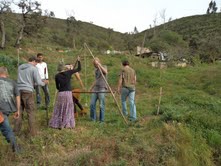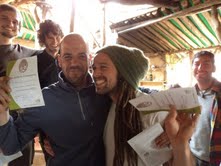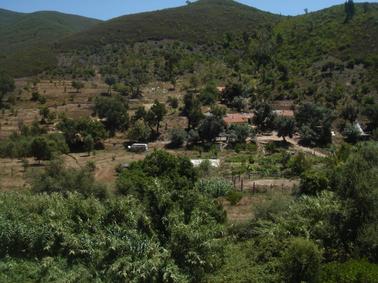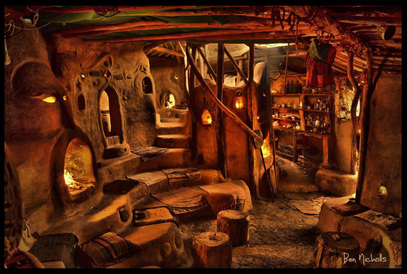Permaculture Design Course
Sorry, all places are now full for this course.
We shall be running our next PDC in September, from 2nd to 14th, with Lesley Martin returning for her 7th PDC here at the Várzea.
From the 4th to 14th of April 2013
Varzea da Gonçala are pleased to announce our 8th full 72-hour Permaculture Design Course,
leading to the internationally recognised Permaculture Design Certificate.
What is Permaculture?
The term permaculture was coined by its founder Bill Mollison, as an amalgamation of “permanent” and “agriculture”. With the expansion of the concept, “agriculture” was made interchangeable with “culture”.
Permaculture integrates people into Nature's design: it blends Applied Science with Ecology and stimulates our inate sense of harmony with the land we live in. An effective permaculture design provides us with shelter, food, water and income, within a balanced and healthy biological community, and offers practical solutions to the global crises we now face.
People encountering permaculture will be attracted to any one of its aspects according to their own outlook: they may see it as a way to being able to survive on their piece of marginal land, or to change global culture and mentality. Personally it has altered my perception of what land is all about, and how I am inseparable from its life.
But the most important feature about premaculture is: it works!
By the end of the course, students will understand the concept of sustainable development as well as the principles and strategies of Permaculture Design, and will be able to apply this knowledge in their private and professional lives.
The Permaculture Design Course is for everyone, regardless of background, education, profession, or experience.
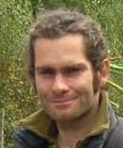
Course leader: Peter Cow
Peter is an experienced Permaculture teacher and designer, currently working in Portugal, Spain and the UK. He took his Design Course in 1998 and received the Diploma in Applied Permaculture Design from the Permaculture Association (Britain) in 2007, and has been teaching Permaculture Design since then, from one hour talks to 2 week residential courses. He also mentors new designers through the 2 year Diploma Apprenticeship.
He co-founded the Steward Community Woodland project in Devon, UK, in 2000,where he lived for 7 full and happy years. He has designed and implemented many Permaculture projects including low impact buildings, water treatment systems,community events, Permaculture trainings and forest gardens, in both the UK and Portugal.
Peter's teaching style is inclusive and engaging, mixing media, learning styles and content to create a rich experience of inspiration, fun and information, supported by a wide range of digital resources (films, ebooks, articles, slideshows) that participants can take away with them at the end of the course. There will also be some guest teachers from the venue and the locality sharing their experience and skills in practical sessions, lectures and tours.
Peter is a keen musician, traveller, cyclist and nature lover, and more information about his teaching, passions and experience can be found at on his website www.livingincircles.com.
Peter is an experienced Permaculture teacher and designer, currently working in Portugal, Spain and the UK. He took his Design Course in 1998 and received the Diploma in Applied Permaculture Design from the Permaculture Association (Britain) in 2007, and has been teaching Permaculture Design since then, from one hour talks to 2 week residential courses. He also mentors new designers through the 2 year Diploma Apprenticeship.
He co-founded the Steward Community Woodland project in Devon, UK, in 2000,where he lived for 7 full and happy years. He has designed and implemented many Permaculture projects including low impact buildings, water treatment systems,community events, Permaculture trainings and forest gardens, in both the UK and Portugal.
Peter's teaching style is inclusive and engaging, mixing media, learning styles and content to create a rich experience of inspiration, fun and information, supported by a wide range of digital resources (films, ebooks, articles, slideshows) that participants can take away with them at the end of the course. There will also be some guest teachers from the venue and the locality sharing their experience and skills in practical sessions, lectures and tours.
Peter is a keen musician, traveller, cyclist and nature lover, and more information about his teaching, passions and experience can be found at on his website www.livingincircles.com.
Images from March 2012 PDC. also led by Peter
Course Aims
This practical course will bring the possibility of significant and positive life changes. Although permaculture is most commonly thought about in connection with gardening & farming, its principles, ethics and design methods can be adapted and used in each individual's own work, interests, land project, community and home to bring about a more harmonious & sustainable lifestyle. Permaculture offers a perspective on all aspects of building a sustainable, regenerative future. Permaculture encourages us to develop and use our individual skills, knowledge and interests, whilst drawing on traditional wisdom, science and our innate ability to observe and learn from the world around us.
Course participants will be awarded the Permaculture Association (Britain)'s internationally recognised Certificate in Permaculture Design.
Learning outcomes:
To observe patterns in nature & apply what we learn to create guiding principles.
To use permaculture ethics, principles & design tools to create sustainable systems.
To understand the importance of caring for soil, water and community, & to know techniques for doing so.
To start using permaculture in your own life, towards creating a more sustainable lifestyle.
To understand how to apply permaculture design to both land-based & non-land-based systems.
Subjects covered:
Observation skills ~ Site surveying ~ Permaculture ethics & principles ~ Design methods ~ Soil conservation and improvement ~ Swales ~ Limiting factors ~ Kitchen gardening ~ Water & sewage treatment ~ Group process skills ~ Agroforestry & Forest gardening ~ Trees & their microclimates ~ Nature connection ~ Patterns in nature ~ Food choices ~ Broadscale farming techniques ~ Sustainable economics ~ Urban permaculture ~ Community living tools ~ Green architecture ~ Wild food ~ Nonviolent communication ~ Design project ~ The Permaculture Diploma ~ Where next?
& lots more......
The course uses group work, discussions, videos, slide shows, observation, sit spot, talking circle, guided walks & practical activities as learning methods, blending informational, experiential, theoretical and practical sessions. This mix is supportive of different learning styles and for people with learning difficulties, and help to create a fun, lively and inclusive course.. We will also be exploring how Permaculture theory is put into action at the Varzea.
Design courses are not just about imparting information to the students, there is plenty of knowledge out there, the important thing is knowing how to use this & feeling confident to do so - empowerment is the essence of the Design Course. The course culminates in the main design activity that helps to consolidate all of the learning and empower students to take Permaculture back into their own homes, lives & community.
As a group we will benefit from collaborative learning & from having fun together. No previous knowledge is required & it is recognised that everyone has their own unique skills, knowledge & areas of interest to bring to the course.
Course participants will be awarded the Permaculture Association (Britain)'s internationally recognised Certificate in Permaculture Design.
Learning outcomes:
To observe patterns in nature & apply what we learn to create guiding principles.
To use permaculture ethics, principles & design tools to create sustainable systems.
To understand the importance of caring for soil, water and community, & to know techniques for doing so.
To start using permaculture in your own life, towards creating a more sustainable lifestyle.
To understand how to apply permaculture design to both land-based & non-land-based systems.
Subjects covered:
Observation skills ~ Site surveying ~ Permaculture ethics & principles ~ Design methods ~ Soil conservation and improvement ~ Swales ~ Limiting factors ~ Kitchen gardening ~ Water & sewage treatment ~ Group process skills ~ Agroforestry & Forest gardening ~ Trees & their microclimates ~ Nature connection ~ Patterns in nature ~ Food choices ~ Broadscale farming techniques ~ Sustainable economics ~ Urban permaculture ~ Community living tools ~ Green architecture ~ Wild food ~ Nonviolent communication ~ Design project ~ The Permaculture Diploma ~ Where next?
& lots more......
The course uses group work, discussions, videos, slide shows, observation, sit spot, talking circle, guided walks & practical activities as learning methods, blending informational, experiential, theoretical and practical sessions. This mix is supportive of different learning styles and for people with learning difficulties, and help to create a fun, lively and inclusive course.. We will also be exploring how Permaculture theory is put into action at the Varzea.
Design courses are not just about imparting information to the students, there is plenty of knowledge out there, the important thing is knowing how to use this & feeling confident to do so - empowerment is the essence of the Design Course. The course culminates in the main design activity that helps to consolidate all of the learning and empower students to take Permaculture back into their own homes, lives & community.
As a group we will benefit from collaborative learning & from having fun together. No previous knowledge is required & it is recognised that everyone has their own unique skills, knowledge & areas of interest to bring to the course.
The Venue
Tranquil, fairly remote, friendly. There is one family here along with long-term helpers, all fellow permaculturists.
Tranquil, fairly remote, friendly. There is one family here along with long-term helpers, all fellow permaculturists.
There are numerous permaculture inspired systems in operation to become familiar with - compost toilets, simple solar hot water systems, grey water cleaning system, farm animals, raised beds and productive organic fruit and vegetable gardens, water retention in the land with swales, pond, wormery, solar-pumping systems, drip and channel irrigation, mulching, traditional bread oven, child-size clay house, food forest in planning, a great many trees planted, rocket stove,...
We have many suitable camping areas, either by the river, near the houses, on the hillside, or under the giant fig tree.
There is always lively social interaction in the evenings, with regular film-shows by projector, and pizza-night on the evening before the free day.
In your free time on the course, local beaches can be visited, you can explore the valley or follow walking trails up the hills.
Facilities - H/C showers, washing machine available for use. We have an electric supply, so you can charge mobile phones.
Accommodation
There is limited accommodation available on a first-come, first-served basis, at an additional cost of €5 per person per night. This consists of a bed in a shared bedroom in a cottage, with kitchen facilities, shower and bathroom, bed linen and towels supplied. Also there is one double room available. Please ask us for availability if you are interested.
What you need to bring
Suitable footwear for land tours and practical work - strong boots are ideal.
A torch.
Please ensure all cleaning products you bring with you contain natural ingredients only. We will have natural soaps and shampoo available to purchase if you wish.
Some more detail...
The course begins on the evening of the 4th (Thursday) to give a relaxed time to meet Peter and the other students and acquaint you with the place and the facilities. There will be pizzas cooked in our bread oven in our social space ("the pit") - if you have any musical instruments please bring them along.
Events will wind up on the following Sunday with the final presentations of the designs - created and presented in groups - and those who need leave this day may do so, or are welcome to stay for a final night celebration, and depart Monday after breakfast.
Referrals!
We have held several PDC´s here. What have past students enjoyed?...
"The people! The surroundings! The Food! Thankyou for everything!" S.Coimbra March 2010
"New Friends. Wonderful atmosphere" A. Ruiva Mar 2010
"I liked everything about this course, the place, the people, the vibes, the food and all the love of the residents" J. Amado Mar 2010
"I don't want to go back to Lisbon" M. Franco May 2010
"I never felt like a paying guest - I stayed with friends" J.Hirt May 2010
"Meeting with like-minded people and learning" F.Raposa Sept 2010
"Entrance into a new world" T.Lucena Mar 2010
"Spending time on a working farm, socializing and making connections" L.Kearney Aug 2011
Thankyou so much for the amazing hospitality!! I'll never forget my experience at the Varzea!" M.Hynes Aug 2011
We have many suitable camping areas, either by the river, near the houses, on the hillside, or under the giant fig tree.
There is always lively social interaction in the evenings, with regular film-shows by projector, and pizza-night on the evening before the free day.
In your free time on the course, local beaches can be visited, you can explore the valley or follow walking trails up the hills.
Facilities - H/C showers, washing machine available for use. We have an electric supply, so you can charge mobile phones.
Accommodation
There is limited accommodation available on a first-come, first-served basis, at an additional cost of €5 per person per night. This consists of a bed in a shared bedroom in a cottage, with kitchen facilities, shower and bathroom, bed linen and towels supplied. Also there is one double room available. Please ask us for availability if you are interested.
What you need to bring
Suitable footwear for land tours and practical work - strong boots are ideal.
A torch.
Please ensure all cleaning products you bring with you contain natural ingredients only. We will have natural soaps and shampoo available to purchase if you wish.
Some more detail...
The course begins on the evening of the 4th (Thursday) to give a relaxed time to meet Peter and the other students and acquaint you with the place and the facilities. There will be pizzas cooked in our bread oven in our social space ("the pit") - if you have any musical instruments please bring them along.
Events will wind up on the following Sunday with the final presentations of the designs - created and presented in groups - and those who need leave this day may do so, or are welcome to stay for a final night celebration, and depart Monday after breakfast.
Referrals!
We have held several PDC´s here. What have past students enjoyed?...
"The people! The surroundings! The Food! Thankyou for everything!" S.Coimbra March 2010
"New Friends. Wonderful atmosphere" A. Ruiva Mar 2010
"I liked everything about this course, the place, the people, the vibes, the food and all the love of the residents" J. Amado Mar 2010
"I don't want to go back to Lisbon" M. Franco May 2010
"I never felt like a paying guest - I stayed with friends" J.Hirt May 2010
"Meeting with like-minded people and learning" F.Raposa Sept 2010
"Entrance into a new world" T.Lucena Mar 2010
"Spending time on a working farm, socializing and making connections" L.Kearney Aug 2011
Thankyou so much for the amazing hospitality!! I'll never forget my experience at the Varzea!" M.Hynes Aug 2011
Prices and Payment:
The course costs 430 euros, which includes camping and excellent vegetarian food.
There is limited accommodation available at an extra 50 euros for the duration of the course, in a shared room in one of our houses.
A 200 euro deposit is required to book a place.
Details of payment methods can be found on our Prices and Booking page.
Please telephone (00351)282995060 or email us [email protected] for more info on course content, or us regarding facilities, venue, booking arrangements etc.
We look forward to hearing from you!
There is limited accommodation available at an extra 50 euros for the duration of the course, in a shared room in one of our houses.
A 200 euro deposit is required to book a place.
Details of payment methods can be found on our Prices and Booking page.
Please telephone (00351)282995060 or email us [email protected] for more info on course content, or us regarding facilities, venue, booking arrangements etc.
We look forward to hearing from you!
